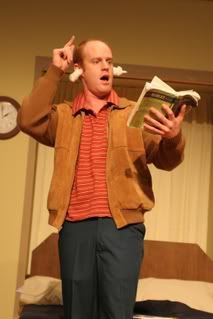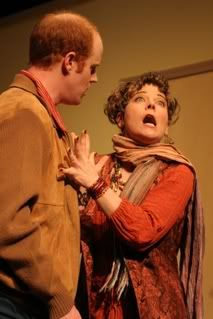Review: “American $uicide”
(opened Feb. 12, 2007)Jackson, actors commit American $uicide at Thick Housethree stars Zesty satire If ``American Idol'' ended each episode with a bullet instead of wild applause, some of us might stop watching. And some of us might start.We love our reality TV in this country, and, truth be told, we love our violence. So far, the two haven't collided much (discounting ``Fear Factor'' if only because ``Fear Factor'' should always be discounted).That's where director/writer Mark Jackson comes in. He's still on a hot streak that began last fall with his Salome at the Aurora Theatre Company and continued through The Forest War with Shotgun Players.With American $uicide, now at the Thick House in San Francisco, Jackson gives us something completely different: an ultra-contemporary twist on a banned Russian play.While researching his brilliant The Death of Meyerhold, Jackson came across Nikolai Erdman, a writer whose second play was the biting comedy The Suicide. Finished in 1928, the play was a hot property, with multiple theater companies competing to produce it. But the Soviet government banned it for its supposed anti-government content. Stalin himself called the play ``empty and even harmful.'' Erdman was reportedly exiled to Siberia several years later and never wrote another play.With the support of Encore Theatre Company and Z Plays, Jackson picks up where Erdman left off and gives us a wickedly funny, wonderfully warped mish-mash of human desperation, celebrity lust and good old American zeal.As a writer, Jackson sets his action in the present day, but he's clearly working in a 1930s stage comedy style with rapid-fire, exaggerated delivery and over-the-top characters. As a director, he takes that style to the next logical step: '40s-style screwball comedy complete with pratfalls, broken dishes and zany costumes (by Raquel Barreto).At the center of the story is a sincere sad sack named Sam Small (the incredibly funny Jud Williford, pictured above). He's unemployed and ashamed that he has to rely on his waitress wife's ``greasy tips'' and stolen sausages to survive.His hardworking wife, Mary (Beth Wilmurt, a comedienne of the highest order), wants to help her husband out of his depression, so when he finally admits his secret desire to be an actor, she does her darndest to be a good cheerleader.With the help of his across-the-hall neighbor, Albert (Marty Pistone), and his girlfriend Margaret (Denise Balthrop Cassidy), who make money on eBay and with their very own porn site, Sam makes his tentative way into show business.This is when the personalities start to leap off the stage. We get a desperate, overly tan film director (Michael Patrick Gaffney) and a 22-year-old starlet (Jody Flader) _ the next big thing who's also making a comeback. But best of all, we get Gigi Bolt, a former director at the National Endowment for the Arts and the current executive director of the Theatre Communications Group.
If ``American Idol'' ended each episode with a bullet instead of wild applause, some of us might stop watching. And some of us might start.We love our reality TV in this country, and, truth be told, we love our violence. So far, the two haven't collided much (discounting ``Fear Factor'' if only because ``Fear Factor'' should always be discounted).That's where director/writer Mark Jackson comes in. He's still on a hot streak that began last fall with his Salome at the Aurora Theatre Company and continued through The Forest War with Shotgun Players.With American $uicide, now at the Thick House in San Francisco, Jackson gives us something completely different: an ultra-contemporary twist on a banned Russian play.While researching his brilliant The Death of Meyerhold, Jackson came across Nikolai Erdman, a writer whose second play was the biting comedy The Suicide. Finished in 1928, the play was a hot property, with multiple theater companies competing to produce it. But the Soviet government banned it for its supposed anti-government content. Stalin himself called the play ``empty and even harmful.'' Erdman was reportedly exiled to Siberia several years later and never wrote another play.With the support of Encore Theatre Company and Z Plays, Jackson picks up where Erdman left off and gives us a wickedly funny, wonderfully warped mish-mash of human desperation, celebrity lust and good old American zeal.As a writer, Jackson sets his action in the present day, but he's clearly working in a 1930s stage comedy style with rapid-fire, exaggerated delivery and over-the-top characters. As a director, he takes that style to the next logical step: '40s-style screwball comedy complete with pratfalls, broken dishes and zany costumes (by Raquel Barreto).At the center of the story is a sincere sad sack named Sam Small (the incredibly funny Jud Williford, pictured above). He's unemployed and ashamed that he has to rely on his waitress wife's ``greasy tips'' and stolen sausages to survive.His hardworking wife, Mary (Beth Wilmurt, a comedienne of the highest order), wants to help her husband out of his depression, so when he finally admits his secret desire to be an actor, she does her darndest to be a good cheerleader.With the help of his across-the-hall neighbor, Albert (Marty Pistone), and his girlfriend Margaret (Denise Balthrop Cassidy), who make money on eBay and with their very own porn site, Sam makes his tentative way into show business.This is when the personalities start to leap off the stage. We get a desperate, overly tan film director (Michael Patrick Gaffney) and a 22-year-old starlet (Jody Flader) _ the next big thing who's also making a comeback. But best of all, we get Gigi Bolt, a former director at the National Endowment for the Arts and the current executive director of the Theatre Communications Group. Bolt is a real person, but her presence here -- in the divine form of Delia MacDougall, left, at her most Carol Burnett-ish -- is sort of an inside joke. What's funny for anyone who knows Bolt or not is the character's grand dame theatricality. ``Life is projected, transmitted and downloaded but no longer LIVED!'' she intones.Once Sam meets all these characters, he gets bamboozled into an outrageous scheme that has him committing suicide on live TV, with viewers bidding astounding sums to have him die in their name or in the name of their cause.Sam agrees to do this because it will ensure his wife won't have to work anymore. Gigi wants him to die in the name of American theater. The starlet wants him to die out of love for her in the hope that the attention might revive her career. And so on.Going into intermission, which occurs just after MacDougall's big scene, I was thinking ``American $uicide'' was just about the funniest thing I'd seen since Hunter Gatherers last summer.But Act 2 disappoints if only because the build-up to the actual suicide -- which takes place in a high N-R-G dance club (sturdy, flexible set by James Faerron) -- results in an almost inevitable anti-climax. By this point we have Middle Eastern operatives and government baddies in the mix (all ably played by Liam Vincent), but Jackson's sharpness dulls.The play is so frenzied and fun that I wanted all the darker currents to amount to more. I had hoped that while we were having a great time watching the show, Jackson's satirical saber was slicing into us more than we realized.That doesn't quite happen, but American $uicide, in all its grandly theatrical glory, remains a comedy to die for.For information about American $uicide, visit www.zspace.org.
Bolt is a real person, but her presence here -- in the divine form of Delia MacDougall, left, at her most Carol Burnett-ish -- is sort of an inside joke. What's funny for anyone who knows Bolt or not is the character's grand dame theatricality. ``Life is projected, transmitted and downloaded but no longer LIVED!'' she intones.Once Sam meets all these characters, he gets bamboozled into an outrageous scheme that has him committing suicide on live TV, with viewers bidding astounding sums to have him die in their name or in the name of their cause.Sam agrees to do this because it will ensure his wife won't have to work anymore. Gigi wants him to die in the name of American theater. The starlet wants him to die out of love for her in the hope that the attention might revive her career. And so on.Going into intermission, which occurs just after MacDougall's big scene, I was thinking ``American $uicide'' was just about the funniest thing I'd seen since Hunter Gatherers last summer.But Act 2 disappoints if only because the build-up to the actual suicide -- which takes place in a high N-R-G dance club (sturdy, flexible set by James Faerron) -- results in an almost inevitable anti-climax. By this point we have Middle Eastern operatives and government baddies in the mix (all ably played by Liam Vincent), but Jackson's sharpness dulls.The play is so frenzied and fun that I wanted all the darker currents to amount to more. I had hoped that while we were having a great time watching the show, Jackson's satirical saber was slicing into us more than we realized.That doesn't quite happen, but American $uicide, in all its grandly theatrical glory, remains a comedy to die for.For information about American $uicide, visit www.zspace.org.